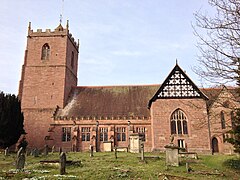Condover
| Condover | |
|---|---|
 SS Mary & Andrew parish church, viewed from the south |
|
| Condover shown within Shropshire | |
| Population | 1,957 (2011) |
| OS grid reference | SJ4906 |
| Civil parish |
|
| Unitary authority | |
| Ceremonial county | |
| Region | |
| Country | England |
| Sovereign state | United Kingdom |
| Post town | Shrewsbury |
| Postcode district | SY3 |
| Dialling code | 01743 |
| Police | West Mercia |
| Fire | Shropshire |
| Ambulance | West Midlands |
| EU Parliament | West Midlands |
| UK Parliament | |
| Website | Condover parish council |
Condover is a village and civil parish in Shropshire, England. It is about 5 miles (8 km) south of the county town of Shrewsbury, and just east of the A49. The Cound Brook flows through the village on its way from the Stretton Hills to a confluence with the River Severn. Condover is near to the villages of Dorrington, Bayston Hill and Berrington. The population of the Condover parish was estimated as 1,972 for 2008, of which an estimated 659 live in the village of Condover itself. The actual population measured at the 2011 census had fallen to 1,957.
Condover contains a higher than normal proportion of Listed buildings and over half of the village has been classified as a conservation area since 1976. The more than forty listed structures in Condover range from six separate early cruck-framed buildings and many black-and-white timbered cottages to the present-day Vicarage and several funerary monuments in the churchyard. Of the early half-timbered houses, the most impressive are Church House, the Old School House and the Small House that is now known as Condover Court.
The parish contains two industrial estates, two sand and gravel quarries and a projected borough recycling plant is currently planned and under discussion. Villagers and the Parish Council are agreed that there should be no increase in the volume of heavy traffic in the Parish arising from the plant and would regret the detrimental effect to such village services as the post office, shops, primary school and other regular services.
In the Anglo-Saxon era between 613 and 1017 the village was the principal settlement in the Hundred (county division)Hundred of Condover, an administrative area that was large enough to sustain about 100 households. By the 11th century Condover was a royal manor of King Edward the Confessor. It formed a significant part of the great Royal forest known as The Long Forest that stretched almost the full length of South Shropshire.
...
Wikipedia

